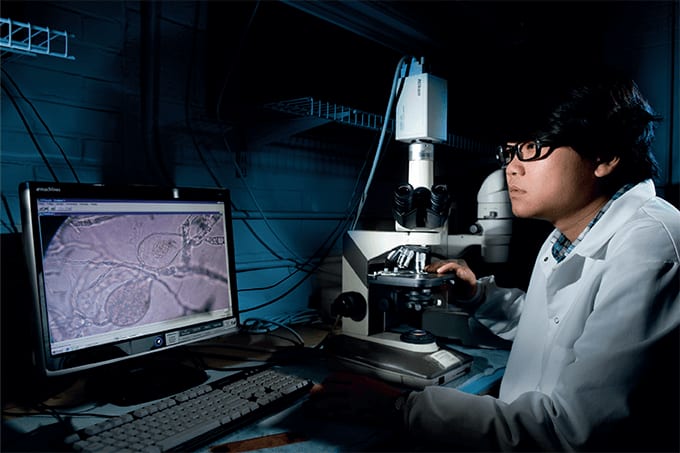- Even when children present with common pancreatitis symptoms, doctors don’t necessarily consider the disease when making a diagnosis
- Delayed, questioned or missed diagnoses can result in prolonged suffering and increased disease severity for pediatric pancreatitis patients
- A new study identifies several new mutations strongly associated with early-onset acute recurrent and chronic pancreatitis
- The mutations may help doctors more accurately predict and diagnose early-onset pancreatitis and even personalize therapy
A child is taken to her primary care doctor with nausea, vomiting, and abdominal pain. What’s the doctor’s first instinct? It’s unlikely to be pancreatitis, even after several episodes of symptoms. This is because recurrent and chronic pancreatic inflammation are uncommon conditions in young children, and many doctors – even those who are knowledgeable about the disease – may not think it occurs often enough to be considered in the differential diagnosis. Unfortunately, this bias can delay diagnosis, resulting in more suffering for the patient and potentially a less tractable disease when the correct conclusion is finally reached. What can we do to address this issue? The first and most critical step is to make sure doctors think of pancreatitis when encountering its common symptoms in children. But beyond that, it’s important to have reliable ways of diagnosing pancreatitis and understanding the mechanisms of the disease. Those were the goals of our recent INSPPIRE (INternational Study Group of Pediatric Pancreatitis: In Search for a CuRE) study (1), in which we examined clinical and genetic data belonging to 342 pediatric pancreatitis patients. We found a number of interesting associations – but the most fascinating were the mutations correlated with early-onset (prior to age six) acute recurrent or chronic pancreatitis, especially alterations in the cationic trypsinogen (PRSS1) and chymotrypsin C (CTRC) genes.
Spotting the symptoms
There are three factors involved in diagnosing acute pancreatitis: abdominal pain consistent with pancreatic inflammation, amylase or lipase elevations over three times the upper limit of normal, and imaging that shows pancreatic inflammation. A patient needs to exhibit at least two of these elements to be classified as having pancreatitis. Our study focused on acute recurrent pancreatitis (ARP) and chronic pancreatitis (CP) in pediatric patients. ARP refers to multiple discrete episodes of pancreatitis with a complete return to normal in between episodes; CP, in contrast, is a permanent scarring of the gland and is accompanied by chronic pain and either endocrine dysfunction (diabetes), exocrine dysfunction, or both. One major difference between these two conditions and acute pancreatitis is that we’re much better able to treat the acute form of the disease now than we were in the past. Patients may need lots of intravenous fluids and aggressive pain control, and research has shown that restarting feeds shortly after diagnosis leads to the best outcomes. Unfortunately, we still don’t know how to best treat ARP and CP – and a large part of the reason why is that, until recently, we didn’t know why children developed those conditions. Now, we have shown that children who develop this condition at a young age often do so because of genetic abnormalities that affect the pancreas.The meaning of the mutations
We have found that mutations in the PRSS1 and CTRC genes have the strongest association with ongoing pancreatitis. PRSS1 mutations affect trypsin, one of the major digestive enzymes created by the pancreas. When this gene is mutated, the result is a dysfunctional trypsin enzyme that can be activated more easily, and is not responsive to the body’s normal deactivation pathways. CTRC mutations also seem to affect trypsin activity because this gene plays a role in trypsin degradation. Our data therefore suggest that dysregulation of trypsin homeostasis is an important mechanism for early-onset ARP and CP. Even among patients with the same or similar mutations, the course of the disease can be quite variable. Some may have a few episodes of mild pancreatitis, whereas others may suffer from severe chronic pain and pancreatic failure. Our hypothesis is that other factors may play a role in determining the clinical severity of the gene mutations – and our task at the moment is to identify those factors.
The road to diagnosis
Knowing that early-onset ARP and CP are predominantly genetic conditions is very important, because it leads us to better screening and diagnostic tools. But even before that, physicians need to be trained to think about the possibility of acute pancreatitis in pediatric patients. If the diagnosis isn’t considered, the proper tests won’t be requested and the patient’s symptoms will remain unexplained. Hopefully, especially for children who experience multiple episodes or develop chronic pancreatitis, our data on the genetic causes will both encourage physicians to look for the cause and provide them with the tools to do so. Considering pancreatitis in the differential diagnosis is a critical first step; once that hurdle is cleared, we hope our studies will help take care of the rest.
Patients who have had multiple unexplained episodes of acute pancreatitis should be considered good candidates for genetic testing. The younger the patient is, the more likely his or her episodes of inflammation will have a genetic cause. That said, I think it’s important to point out that, even in the oldest age group in this study, over half (54 percent) of patients had a genetic abnormality. I would therefore consider genetic testing to be important in any pediatric patient with potential ARP or CP.
Our study focused on just four genes – PRSS1, CTRC, CFTR, and SPINK1 – but there have been reports of other genetic causes of pediatric pancreatitis that still need further examination. It is also very likely that additional factors remain to be discovered and described. Ultimately, we hope to use any genetic information we can glean to determine what treatments work best for ARP and CP, to see whether patients’ responses to these treatments can be predicted based on the underlying genetic drivers of their disease. The ability to one day apply precision medicine to pediatric pancreatitis is one of the most exciting aspects of our research.
References
- MJ Giefer et al., “Early-onset acute recurrent and chronic pancreatitis is associated with PRSS1 or CTRC gene mutations”, J Pediatr, 186, 95–100 (2017). PMID: 28502372.




